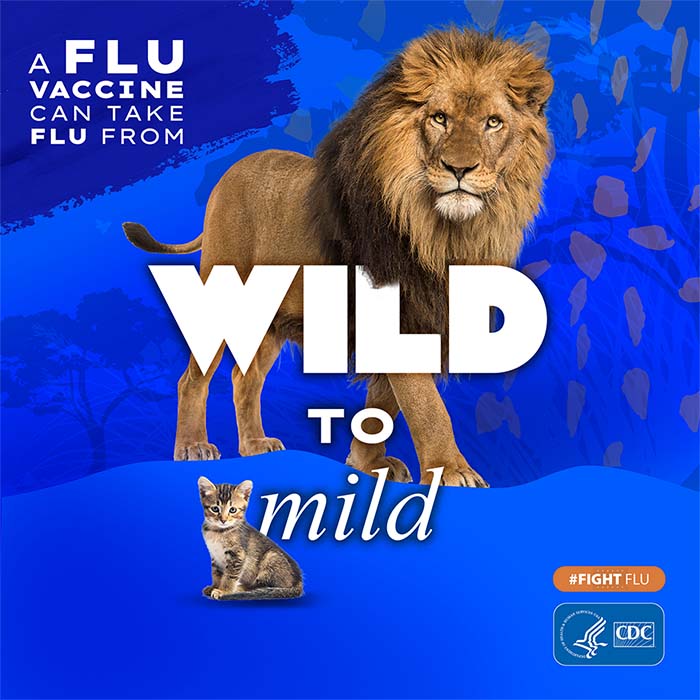Flu & People 65 Years and Older
- Flu vaccination is especially important for people 65 years and older because they are at higher risk of developing serious flu complications.
- While flu seasons vary in severity, during most seasons, people 65 years and older bear the greatest burden of severe flu disease.
- CDC and the Advisory Committee on Immunization Practices (ACIP) preferentially recommend the use of higher dose flu vaccines (including high-dose inactivated and recombinant) or adjuvanted inactivated flu vaccine over standard-dose unadjuvanted flu vaccines for people 65 years and older.
- CDC recommends prompt flu antiviral treatment for people who have flu or suspected flu and who are at higher risk of serious flu complications, such as people 65 years and older.

How age affects risk
People 65 years and older are at higher risk of developing serious flu complications compared with young, healthy adults. This increased risk is due in part to changes in immune defenses with increasing age.
While flu seasons vary in severity, during most seasons, people 65 years and older bear the greatest burden of severe flu disease. In recent years, for example, it’s estimated that between 70 percent and 85 percent of seasonal flu-related deaths have occurred in people 65 years and older, and between 50 percent and 70 percent of seasonal flu-related hospitalizations have occurred among people in this age group.
Specific flu shots for people 65 years and older
CDC and ACIP preferentially recommend the use of higher dose flu vaccines (high-dose inactivated and recombinant) or adjuvanted inactivated flu vaccine over standard-dose unadjuvanted flu vaccines for people 65 years and older. This recommendation is based on a review of available studies which suggests that, in this age group, these vaccines are potentially more effective than standard dose unadjuvanted flu vaccines. If one of these vaccines is not available at the time of administration, people in this age group should get a standard-dose unadjuvanted inactivated flu vaccine instead. There are other flu vaccines approved for use in people 65 years and older. People 65 years and older should not get a nasal spray vaccine.
Keep Reading:
Prevention
A flu vaccine is the best protection against flu
The best way to protect against flu and its potentially serious complications is with an annual flu vaccine. Flu vaccination has many benefits. It has been shown to reduce the risk of getting sick with flu and also to reduce the risk of more serious flu outcomes that can result in hospitalization or even death. Although immune responses to vaccination may be lower in older people, studies have consistently found that flu vaccination has been effective in reducing the risk of medical visits and hospitalizations in older people. Higher dose and adjuvanted flu vaccines are potentially more effective than standard dose unadjuvanted flu vaccines for people in this age group and are therefore recommended preferentially over a regular dose flu vaccine.
Flu vaccination timing
For most people who need only one dose of influenza vaccine for the season, September and October are generally good times to be vaccinated against influenza. Ideally, everyone should be vaccinated by the end of October.
Most adults, especially those 65 years and older, should generally not get vaccinated early (in July or August) because protection may decrease over time. However, early vaccination can be considered for any person who is unable to return at a later time to be vaccinated.
Pneumococcal vaccination is also important
- Having flu increases your risk of getting pneumococcal disease.
- Pneumococcal pneumonia is an example of a serious flu-related complication that can cause death.
- People who are 65 years and older also should be up to date with pneumococcal vaccination. This vaccination helps protect against pneumococcal pneumonia and other serious infections.
- You can get the pneumococcal vaccine your provider recommends when you get a flu vaccine.
- Talk to your health care provider to find out which pneumococcal vaccines are recommended for you.
Keep Reading:
Other preventive actions
In addition to getting a flu vaccine, everyone should take everyday preventive actions, including avoiding people who are sick, covering coughs and sneezes, and washing hands often. This also can include taking steps for cleaner air and hygiene practices like cleaning frequently touched surfaces.
Keep Reading:
Treatment
People who are 65 years and older should call their health care provider right away if they get flu symptoms. CDC recommends prompt flu antiviral treatment for people who have flu or suspected flu and who are at higher risk of serious flu complications, such as people 65 years and older.
Keep Reading:
